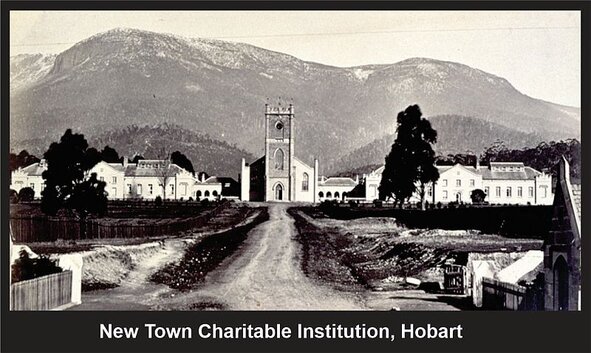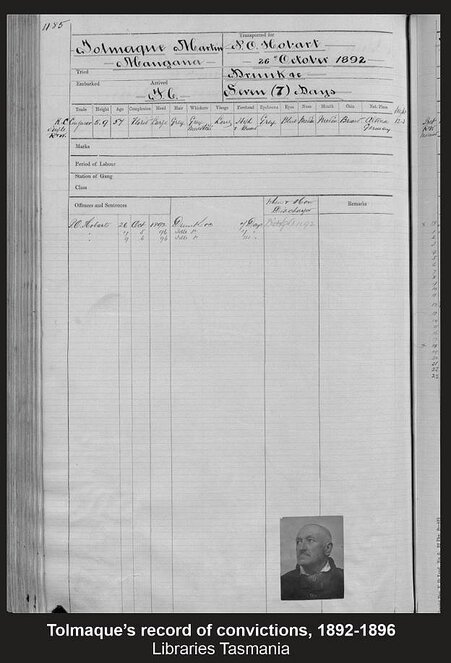The Eloquence of Herr Martin Tolmaque
Chapter Eight - Declining Years
I suppose poor Tolmaque is now sleeping his long sleep, but while life lasts I shall always think of him as a good friend to many, and that he was his own worst enemy; and that, while many professors I met with were looked upon as sane but were mostly mad, he, while looked upon as mad, was sanely sane.
- A. J. Sullivan: A Recollection of Professor Tolmaque, Labor Call (Melbourne) April 1, 1926
- A. J. Sullivan: A Recollection of Professor Tolmaque, Labor Call (Melbourne) April 1, 1926
Martin Tolmaque may have been released from New Norfolk and lucid enough to see his articles published, and to give evidence to the Commission. He was not, however, recovered. On February 2 it was reported in the Tasmanian News that his health had completely broken down and he was obliged to seek refuge in the General Hospital, “in a very precarious condition.”
By March 6 he was said to have sufficiently recovered to resume his active life once more, and a performance was announced at Bridgewater in Mrs. Browne’s hotel on March 7. On March 9 he was admitted to the New Town Charitable Institution. This invalid depot, run by the government, was originally used to house orphaned and destitute children; in 1879 the Orphan Schools closed and the buildings were used for the Male Division of the New Town Charitable Institution for invalids, the destitute, and the aged poor. Located just 4km from the centre of Hobart, it was not an ‘asylum’ in the same way as New Norfolk, but Martin would come to be a constant resident at the Institution, where it is hoped he received a better level of care and lodging. He was once mentioned as working as Messenger for the institution. He was resident number 12488 at New Town, and the various records of his entry and exit from the institution mention that his return journeys to Hobart (although a very short distance) were made aboard the S.S. Mangana, a ship which travelled between Hobart and Melbourne.

Here at the Institution, Martin, in evening dress, gave an amusing exposition of phrenology for an evening concert in July. This was his last known performance. Examination of this list of his entry and exit dates at the Institution shows that he spent many months there at times, and he was resident for fully three years from the end of 1889 until late 1892.
There were some rare appearances in these later years. In January 1887, Martin advertised a Two Guinea course in Conjuring and So-Called Spirit Manifestations, his address noted only as ‘Post Office, Hobart.’ Later in the same year, he gave a public speech in the Domain, on the subjects “New Norfolk Asylum, the Invalid Deport Hobart, The Hospitals Hobart and Launceston, How I Mesmerised Dr. Thompson, the Launceston Gaol, and Dr. Crowther and Beef Tea – collection to enable Prof. Tolmaque to carry on the war.” Whether these were eloquent speeches or bordering on the garrulous, is difficult to guess, but they must have been successful enough for Martin to announce a further appearance on the subjects of “The Invalid Depot; how the invalids are treated, Spiritualism versus Religion, and A Few More New Norfolk Recollections.” On the second occasion, he mentioned his address as 5 Chatsworth Terrace, Park Street, Glebe (1) – so it is hoped that for a time he had some accommodation aside from the institution.
From the sparse public record, there is little more to be discovered until 1896. This list of Tolmaque’s various admissions and discharges demonstrates that frequently he was in need, either of accommodation and community care, or was, sadly, in a condition that landed him back at the New Norfolk Asylum on another four occasions, for unknown duration.
(Unless specified as admission to the New Norfolk asylum, these admissions were made to the New Town Charitable Institution at Hobart.) (1)
1884 – New Norfolk - April 26th discharged January c.10, 1885
1885 – March 9, discharged August 24.
1885 – August 29, discharged June 9, 1886 ‘on pass’
1886 – June 14, discharged December 6 ‘Absent on leave’
1888 – January 31, discharged February 20 ‘by approval’
1888 – February 27, discharged November 21 ‘own request’.
1888 – November 29, discharged February 2, 1899 ‘on pass.’
1889 – April 25, discharged April 30 ‘To the police’
1889 – May 2, discharged May 9 ‘to hospital’.
1889 – May 27 New Norfolk no discharge date known
1889 – December 9, not discharged until October 26, 1892
1892 – November 15, discharged November 22
1892 – November 23, discharged January 9, 1893, returned to New Norfolk.
1893 – January 9 New Norfolk. His Medical certificate from Hobart Hospital is misdated at January 9, 1892. Admission papers show the correct date as January 9, 1893. Discharge date unknown.
1896 – General Hospital May 1, discharged May 6 ‘own request’.
1896 – June 30, discharged July 11 ‘own request’.
1896 – September 10, discharged October 6, ‘own request’
1897 – February 8, not discharged until July 30, 1900 ‘to General Hospital’
1900 – August 11 New Norfolk, discharge date unknown
1904 – August 16, New Norfolk, discharge date unknown
1907 – Death recorded as a resident at New Town institution, September 26
The people of Hobart seem to have come to regard Herr Tolmaque as an eccentric, sometimes wearisome person, but perhaps viewed him with some sympathy. There were three periods in which he was charged with either drunkenness or being idle and disorderly (October 1892, May and June 1896) and the sentence on those occasions, either 7 or 14 days imprisonment, appears to have been served in a gaol cell. Fortunately for us, in the official register of prisoners (3) is pasted a small head and shoulders photograph of Martin Beaufort Tolmaque; the only known image of the magician.

In 1896, Martin ran into a series of small troubles. He had advertised in April (4) his intention to publish a series of articles on the New Town Charitable Institution, saying that “those who look for scandal will be disappointed.” As it happens, no articles followed. Taking up public speaking once again, he tried in July to take “for his subject the levelling of the classes. He tried to impress on his audience that the common level of a despotic power weighed on all classes of Tasmanian society … his hearers refused to listen to such remarks, and when the professor took up a collection the sum total was sixpence.” June took him to prison for 14 days for vagrancy.
August saw him once more before the courts, charged with being of unsound mind, having held conversations with people in shops and getting so worked up that to get rid of him, he was offered money. This he appeared to deem a gross insult. Remanded to the General Hospital for a fortnight, he was agreeable, but said that what he really wanted was for the Government to pay his fare to America or some other place.
Of his periods at New Norfolk, some insight may be gleaned from the following extracts from his admission papers (5), and it is sad to see the doctors’ remarks regarding his sometimes aggressive behaviour. Saddest of all is the 1892 notation that “he will for a long time talk wildly about the immense sums of money he used to make at his profession”, and the 1904 notation that “… States that he is a magician by appointment to the Duke of Northumberland and is on intimate terms with the nobility of England.” Amongst his confusion and delusion, there was still a core of truth – he had performed before some of society’s best in England, and enjoyed some glory days, which were now turned against him, as proof of his insanity.
- Hebrew religion noted, but in 1893 said to be Lutheran.
- Vagabondage - imagines people conspire against him - threatened violence against best friends. Afraid of being poisoned. Carries metal canister with him, states it holds gold. Is continually attitudinising in the street trying to mesmerise places & persons. States he has a considerable amount of property, whereas in reality he is a pauper. Speaks in an indecent manner. Exposes his person and behaves indecently.
- [1889] "unstable and vicious."
- [1892] "talks very energetically & volubly and in a strange excited manner." Notes about his condition – “threatened to take his life.”
- [1893] "Excitement consequent on expectation of returning to former occupation."
- [August 1900] "Delusions of grandeur."
- [August 1904] “Dangerous to others - Yes. Suffering from delusions. States that he is a magician by appointment to the Duke of Northumberland and is on intimate terms with the nobility of England. Exaggerates as to the number of languages he can speak, sometimes stating that he can speak 13, at others 20, and again 40 different languages. [Had been] violent and difficult to keep under control. Threatened other inmates.”
Martin Beaufort Tolmaque, wanderer, conjuror, escape artist, mesmerist, phrenologist, writer and speaker, died on September 26, 1907 at the New Town Charitable Institution. He was buried two days later, in an unmarked grave of the “Paupers, B” section of the Cornelian Bay Cemetery (Hobart) and Crematorium. In 1935 the pauper’s burial section was closed, and today the only record of the area is a memorial plaque stating “In memory of all those interred in the Pauper burial areas – the grave sites are unknown. November 1872 – March 1935. Plaque placed by the Southern Regional Cemetery Trust, D. J. Anderson Chairman, May 1998”
The life story of Herr Tolmaque has been difficult to track, hard to fully comprehend, and distressing to read. Had he remained in Britain, perhaps he would have achieved a more lasting fame. Had he settled in one large city in Australia, perhaps he might have made a comfortable living. We can say with certainty that he was an innovative and talented performer of the minimalist style of magic, and that in his writing and stage presentation he was fluent, intelligent and amusing. But Tolmaque’s character, from start to finish, marked him as a wandering nomad, destined to have some moments in the sun and many more in the cold shadows.
The life story of Herr Tolmaque has been difficult to track, hard to fully comprehend, and distressing to read. We cannot do more than offer his story ‘as it was’. Martin himself did not waste any self-pity in his ‘The Struggles of Life’, so let us close this tale in his own words:
And now, dear reader, I have not given you all my adventures, by floods and field, but enough I think, to enable you to glean an insight into the ‘inner life’ of a professional ‘Nomad.’ My task is done. Lower the curtain, put out the lights, and if my entertainment has given you satisfaction, I pray you to speak of it as, in your opinion, its merits deserve. Goodnight! Till we meet again.
References for Chapter Eight
(1) There is still a Chatsworth Terraces ‘History Hotel’ at 109 Brooker Ave/Hwy, Glebe, Hobart, which runs directly alongside the old Park Street.
(2) Sources for admission or discharge at New Norfolk and the New Town Charitable Institution:- Returns published in the Tasmanian Police Gazette; also the ‘Search for a Resident’ link at:
https://www.orphanschool.org.au/searchntci.php
https://www.orphanschool.org.au/searchntci.php
which appears to have been compiled from Tasmanian Police Gazettes - POL 709 / 1
(3) Libraries Tasmania, GD63-2-1P488 page 485
(4) Tasmanian News, Hobart, April 30, 1896 p.2
(5) Scanned copies of medical certificates, admission papers and doctor’s comments are held at: